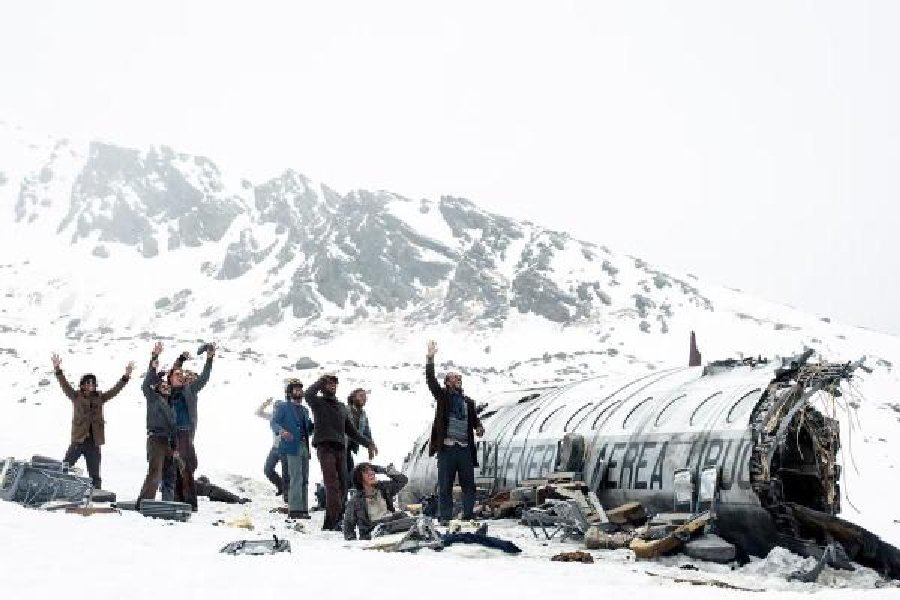Winter just got a whole lot more chilly with Society of the Snow. Highly intense and deeply disturbing but also a rousing and uplifting tale of hope and resilience, this Spanish film, which dropped on Netflix recently and is the country's official entry to this year's Academy Awards, is easily one of the best things I have watched in quite some time. The extreme survival thriller is based on a real-life tragedy that has not only been etched in history but has also found its way to screens big and small. Sometimes as a film, sometimes as a documentary but always as a story of what the human mind and spirit, when thrown in at the deep end, is capable of.
Directed by J.A. Bayona — the man behind films like The Orphanage, The Impossible and Jurassic World: Fallen Kingdom — Society of the Snow (La sociedad de la nieve in Spanish) chronicles the harrowing 72 days that the dwindling count of passengers (most of them being young members of a local Uruguayan rugby team) spent fighting for survival in the harshest of conditions when their plane crashed in the deep recesses of the Andes mountains.
The 1972 Flight 571 saga, considered one of the greatest survivalist stories of modern times, has, till now, remained best known for its desperate survivors resorting to cannibalism to stay alive. But only now in its latest retelling has the story received a definitive film treatment, with humanity scoring over horror.
But that isn't to say that watching Society of the Snow is not a harrowing experience. I had to pause and pull away several times during its 145-minute runtime because this is a film that places the viewer directly and deeply in the shoes of its characters. Their horror is ours, their helplessness feels deeply personal and their conflicting emotions of fleeting highs and permanent lows seem strangely relatable.
Viscerally shot — Pedro Luque's brilliant camerawork puts us at the front and centre of the tragedy — Society of the Snow is treated and shown for what it truly is: a colossal tale of endurance. Based on the book of the same name by Pablo Vierci and taking the informed decision of casting a virtually unknown group of actors, most of whom are newcomers, Society of the Snow hits the ground running. The crash itself is filmed in such a way that makes you a part of the horror, with the screenplay shifting between the survivors' suffering in what quickly starts becoming a snowy grave for most of them and the happy-go-lucky lives they spent in the Uruguayan capital of Montevideo, their hometown, surrounded by friends and family. The contrast is deeply felt and makes the feeling of dread come alive in more ways than one.
Shocked at first, the survivors hold on to the hope of being rescued, but as the days pass by, the likelihood of that starts dimming. Making the half-blown-out fuselage of the plane their cramped 'home', they have to take the tough decision of eating the bodies of their dead mates when rations run out. Bayona, working out of a screenplay written with Bernat Vilaplana, Jaime Marques and Nicolas Casariego, takes a spiritual route to arrive at this moment with the film more focused on exploring questions of humanity than on exploiting the carnage.
When it comes to deciding whether to eat those who have already died, they first discuss and argue the idea. Isn’t it the same as organ donation? Is it worth freezing to death to avoid a hard choice? Moments that could have suffered in the hands of a lesser filmmaker have a strong emotional pull here, as when some of the players let their teammates know they permit them to feed on their bodies if they die. When we do see the flesh and consumption, the film shows it as a fact, without sensationalising it. It is with Society of the Snow that this story’s public image is no longer defined by this extreme choice.
What scores as a major win is that the film makes every player count, each with a story of hope and hopelessness to tell. There is an inherent grace and dignity that runs through the narrative, with the film balancing a stark, haunting adventure with the moral and philosophical quandaries of what it takes to sustain oneself in body and spirit in impossible conditions.
At one point, two of the members — the film retains the real names, with the blessings of the real-life heroes — while scaling endless mountain peaks in the hope of bringing rescue, pause at the top of one, surrounded by an endless carpet of snow. "It's beautiful," one of them says, staring in deep admiration, despite knowing that they could easily lose their lives to it. That's what Society of the Snow is — a beautiful account of a viscerally terrifying tragedy.
Which is your favourite survival story? Tell t2@abp.in











